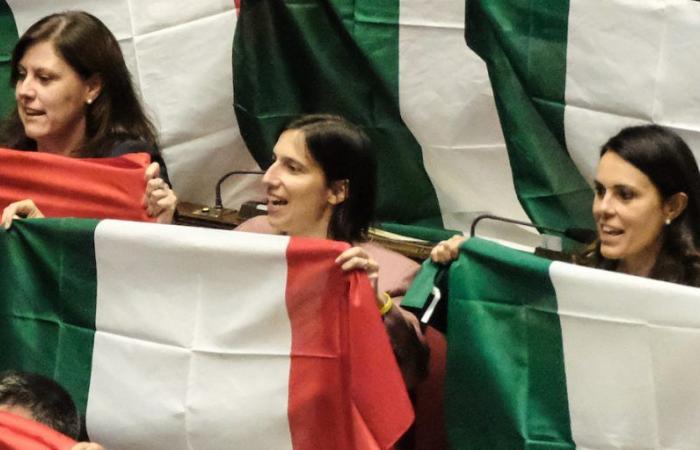Around the bill on differentiated autonomy, definitively approved on Tuesday morning by the Chamber, a debate was generated with animated tones but with rather confusing and sometimes incongruous contents. The centre-left oppositions, some commentators in newspapers and on social networks more or less hostile to the right-wing majority, but also scholars and experts on the subject, have drawn on a combative lexicon, often used in these controversies: and so the project of the government of transferring some functions and prerogatives from the central state to the regions has been described as “splitting Italy”, or as “the secession of the rich”.
The accusation is of promoting a law that will have the effect of increasing the divergences between the North and the South of the country, benefiting the richer and more developed northern regions, to the detriment of the southern ones. The right responded by saying that the bill will guarantee an improvement in the essential services offered by the State throughout the national territory, and that in general autonomy will be an opportunity for everyone, even for the most backward areas, because it will give more responsibility the local administrators of the South. On both sides, in truth, glaring inconsistencies emerge with the positions taken on the issue of federalism and regionalism differentiated by the parties in the more or less recent past. The right and the left, in essence, today condemn theses and proposals that they themselves had supported, consequently generating a confusing media debate.
The centre-left, in fact, is today criticizing the outcome of a reform for which it had laid the foundations. In fact, it was Massimo D’Alema, leader of the Democrats of the Left, who introduced the principles of federalism into Title V of the second part of the Constitution, which regulates the functioning of local authorities. First as president of the Bicameral Commission, established in 1997 to formulate constitutional reforms shared by the centre-right and centre-left, and then above all as Prime Minister, D’Alema promoted the reform of that part of the Constitution together with the Minister for Institutional Reforms Giuliano Amato. The bill was presented by the government to the Chamber on 18 March 1999, and then followed the long path foreseen for constitutional reforms. It was definitively approved by the Chamber on 8 March 2001.
The reform of Title V assigned, among other things, a certain financial and legislative autonomy and new powers to the regions, recognizing them the right to legislate exclusively on some matters and to do so in competition with the central state on other matters. It also established the institutional path that any new laws would have to follow to increase the autonomy of the regions, providing that these measures would have to be approved by an absolute majority of the elected representatives of the two chambers.
The secretary of the PdS Massimo D’Alema welcomed at the federal congress of the Northern League by Umberto Bossi, 12 February 1995 (LaPresse)
More than by federalist convictions, D’Alema’s project was animated by political reasons. It was an attempt to foster an agreement between the left and the Northern League in view of the election of the President of the Republic in May 1999, for which D’Alema suggested renewing the mandate of the incumbent president, Oscar Luigi Scalfaro. But it was also an attempt to convince Umberto Bossi, or at least a substantial part of his electorate, to support the center-left in the campaign for the 2001 general elections.
It didn’t exactly go that way. In fact, the League rejected any hypothesis of agreement with the left and opposed in all parliamentary steps the approval of the Title V reform, voted only by progressive parties with the exception of Rifondazione Comunista. In March 2001, shortly before the final vote in the Senate, Bossi actually said that «the Amato-D’Alema federalist reform is the Italian communists’ contribution to the Stalinist cause». Conversely, the leaders of the centre-left spoke only well of it: D’Alema defined it as «a great contribution to the development of the country», Walter Veltroni said that it was «a must» and Francesco Rutelli celebrated it as «an extraordinarily positive fact that shows the difference between those who want federalism and those who only do propaganda.”
In the 2001 elections, in any case, the League strengthened its alliance with Silvio Berlusconi’s Forza Italia and the centre-right coalition clearly won the elections, obtaining a large majority in both chambers.
So the Northern League Minister for Regional Affairs Roberto Calderoli is not entirely wrong when he says that many of the premises of today’s differentiated autonomy, of which he is the main inspirer, lie in that law desired by the centre-left 24 years ago.
The current reform, in fact, starts from the 23 matters indicated in the new formulation of Title V, establishing the ways and procedures through which the regions can ask the government for greater autonomy in managing them. Compared to 2001, on this issue, there has been a reversal of roles: the centre-left opposition parties have announced that they intend to collect signatures to call a repeal referendum that will cancel the law. In March 2001, however, it was Bossi, together with Berlusconi, who announced a repeal referendum, defining the newly approved law as too timid, “a false federalism”. The referendum was actually held, in that case, but not the repealing one: having been approved without a two-thirds majority of parliament, the constitutional reform was subjected to a confirmatory referendum. It was approved by 64 percent of voters.
Elly Schlein and Stefano Bonaccini in the national headquarters of the PD during the night of the European elections, 10 June 2024 (FABIO CIMAGLIA/ANSA)
But there have been changes in positioning even more recently. In 2019, Giuseppe Conte’s first government started, on a proposal from the League, a process to introduce differentiated autonomy similar to the one that ended on Tuesday in the Chamber, after which not only some centre-right presidents, but also others from the centre-left, asked the competent minister Erika Stefani to begin the procedures for transferring responsibilities.
Even those today most hostile towards autonomy, such as the Campanian Vincenzo De Luca of the Democratic Party, presented the request for autonomy to the government. The same happened in Tuscany, at the time governed by the center-left with Enrico Rossi, and in Emilia-Romagna, led by Stefano Bonaccini, of the PD.
Emilia-Romagna, together with Veneto and Lombardy governed by the League, had been the first to define preliminary agreements on this in February 2018, and those agreements were signed by members of Paolo Gentiloni’s centre-left national government. When Conte’s government took office, Bonaccini was often insistent in asking Minister Stefani for resoluteness, demanding adequate and rapid funding to make the first transfers of competences effective.
Furthermore, Bonaccini was trying to intercept a rather widespread belief in the North, not only among the right-wing electorate: that the more advanced areas of the country could better express their economic capabilities if they were put in a position to act with greater autonomy and to retain territory a more substantial part of the wealth produced, without instead having to contribute to a certain extent to compensate for the imbalances and backwardness of the South. Elly Schlein, who today as secretary of the PD fervently animates the protest against the differentiated autonomy promoted by the Meloni government , did not oppose in any way the positions taken by Bonaccini not even from 2020 onwards, when Schlein himself was vice-president of Emilia-Romagna, with important delegations in the regional council.

The meeting between Prime Minister Giorgia Meloni and Deputy Prime Minister Matteo Salvini, in Rome, 6 December 2023 (Lega press office / ANSA)
The right is no less inconsistent. In general, the priorities indicated for years by Fratelli d’Italia contradicted the principles underlying differentiated autonomy: Meloni’s party has always called for greater powers for Roma Capitale with a view to centralizing state functions, and has if anything proposed to grant greater prerogatives to mayors by subtracting them from those recognized to regional presidents.
And some of these contradictions are generating political tensions within the majority parties. Under the initiative of the president of Calabria Roberto Occhiuto, various parliamentarians and local administrators of Forza Italia, not only from the south, are intervening with very critical tones towards the choice to vote for differentiated autonomy, fearing a significant loss of consensus on the South. But critical positions are also emerging among Calabrian, Sicilian and Abruzzo representatives of the Lega and Fratelli d’Italia.
Furthermore, these tensions and attacks from the opposition concern the approval of a measure that will only be able to produce its first concrete effects in a long time. In fact, the law provides that before starting the procedures to transfer greater competences to the regions, the government must define the essential levels of performance (LEP), i.e. the minimum essential public services that the State must guarantee to citizens throughout the regional territory, but there it will probably take years to establish them (we have explained the issue more fully here).
The alarms about the fact that differentiated autonomy could lead in the short and medium term to an increase in the differences between Northern and Southern Italy, however, have their basis. All the most authoritative national and international institutions that were consulted by parliament or that expressed their opinions on the matter, in fact, considered the risk of an increase in the gap likely: among others, the Bank of Italy, the Parliamentary Budget Office ( UPB), and the European Commission.
Above all, beyond this risk, according to the Bank of Italy and the PBO, the fragmentation generated by autonomy could make the country less competitive overall, especially on those matters (infrastructure, energy, research, labor policies) on which At least national coordination is required. Differentiated autonomy, in this sense, would lead for example to increasing the number of authorizations that companies would have to obtain from different regions, or to complicating bureaucratic procedures for projects that concern more than one region.
After that, the profound divide between Northern and Southern Italy, at a level that has no equal in Europe, certainly did not arise with differentiated autonomy, on the contrary, it has existed more or less since the Unification of Italy. Therefore those who support the reform say that it would contribute to making local administrators responsible, because it would enhance the abilities of good administrators and make the shortcomings of the less efficient ones more evident.
But scientific literature and historiography have shown that the only period of the twentieth century in which the economic distance between North and South really reduced, even if gradually, was when there was centralized management of investments in favor of the South. That is the first phase in which the Cassa per il Mezzogiorno was operational, from its foundation in 1950 until the first half of the Seventies. In those twenty years it was led by a board of directors made up of technicians independent from politics and without any direct link with the local administrations benefiting from the projects, and in the same period the gross domestic product per capita of the southern regions went from 50 to almost 60 percent of that of the rest of the country.
This virtuous development, however, was interrupted starting from the 1970s, when the Southern regions became increasingly directly involved in the management of the Cassa, which was increasingly subjected to political conditioning and pressure, with consequent clientelism that made the mechanism inefficient. .
– Read also: Is differentiated autonomy really convenient for us?







